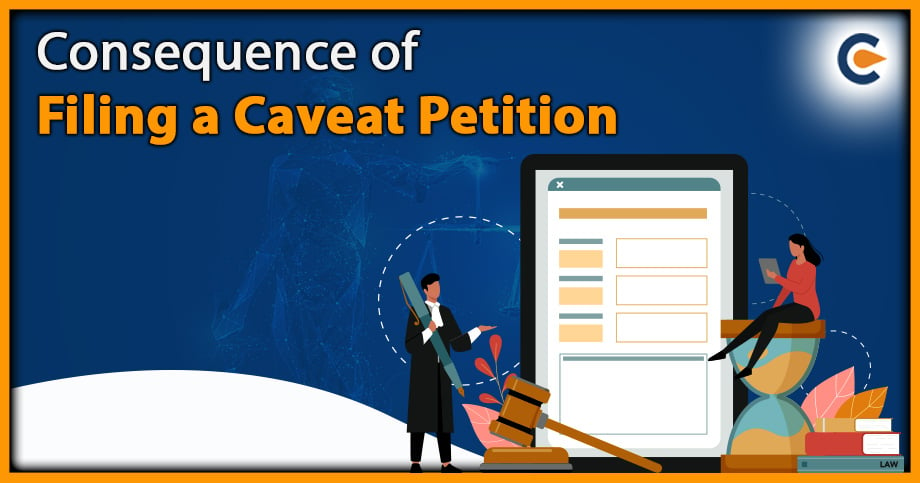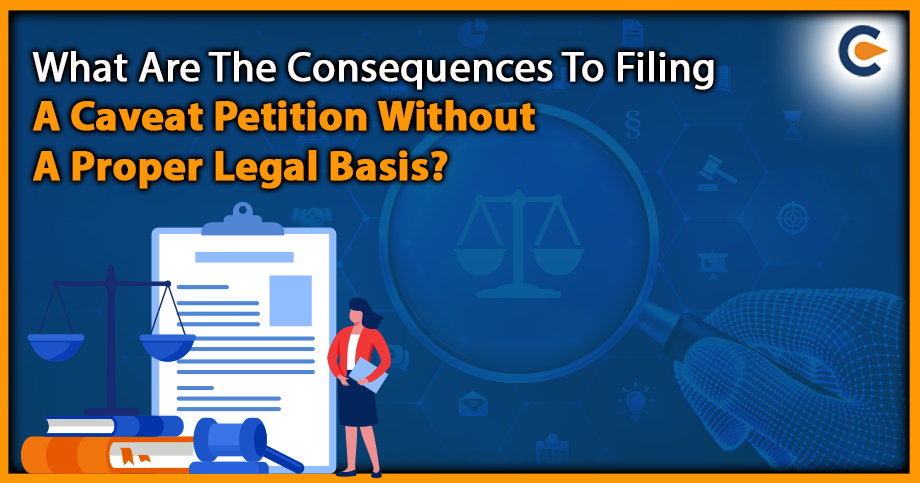When it comes to taking a matter to court, there are several detailed procedures that need to be followed. In addition, there are formalities that need to be completed before you have your day in court. These procedures are laid out in the Civil Procedure Code. The purpose of these procedures and formalities is that helps collect as much basic information about the case as possible. It also helps record the fundamental arguments of the parties involved. And last, but not least, it standardizes the way information is presented to the court. All of this helps bring the judge up to speed with the case before the hearings begin, hence saving the court time. Here Know about the Consequences of Filing a Caveat Petition
These procedures and formalities are nothing but prescribed means in which a party to a case can say what they want to say. Some of these are mandatory and some are circumstantial. One such procedure for a party to say what they want to say to the court is filing a caveat petition.
The caveat in Latin literally means ‘beware’ or ‘make aware’. A caveat is a notice that is served on the aggrieved party. However, unlike other notices, which are served by one party to another, a Caveat is served to the court. And another unique feature of the Caveat is that it does not initiate any legal proceedings. So let us understand what a Caveat is.
Effects of Filing a Caveat Petition
It’s a legal document filed with a court or probate registry to prevent someone else from obtaining a grant of probate or letters of administration. It is typically filed by someone who has an interest in the estate of a deceased person but who is not the executor or administrator. While a caveat petition can be a powerful tool for protecting one’s interests, it is important to understand the potential consequences of filing such a petition. In this blog post, we will explore the consequences of filing a caveat petition.
- Delay in Probate Proceedings The most immediate consequence of filing a caveat petition is a delay in the probate proceedings. Once it has been filed, the court will notify the executor or administrator of the estate, and the grant of probate or letters of administration will be put on hold until the matter is resolved. This can cause significant delays in the distribution of the deceased person’s assets and may also result in additional legal fees and expenses.
- Legal Costs and Expenses Filing it can also result in significant legal costs and expenses. If the matter proceeds to court, both parties will need to retain legal counsel, which can be expensive. In addition, the person filing the caveat petition may need to pay court fees and other expenses associated with the legal proceedings. These costs can add up quickly and may ultimately outweigh any potential benefits of filing the caveat petition.
- Risk of Damaging Relationships Filing a caveat petition can also damage relationships between the parties involved. If the executor or administrator of the estate is a family member or close friend, filing a caveat petition can strain those relationships and create tension and conflict. In some cases, the damage to these relationships may be irreparable, and the parties may be left with long-lasting animosity and resentment towards each other.
- Possibility of Losing the Case Finally, it is important to remember that filing a caveat petition is not a guarantee of success. While a caveat petition can prevent someone else from obtaining a grant of probate or letters of administration, it does not necessarily mean that the person filing the petition will ultimately prevail in the matter. If the caveat petition is not successful, the person filing the petition may be left with legal costs and expenses and no real benefit or resolution to the matter.
- It can be filed only by someone who has an interest in the subject matter of the dispute. It is not available to a third party who has no direct interest in the dispute.
- It can be used in various types of legal disputes[1], such as property disputes, succession disputes, matrimonial disputes, and civil suits.
- Filing a caveat petition does not guarantee a favourable outcome in the dispute. It only ensures that the caveator will be heard before any interim order or final order is passed in the matter.
- Filing a caveat petition can be an effective strategy to prevent ex-parte orders. An ex-parte order is an order passed by the court without hearing the other party. By filing a caveat petition, the caveator ensures that the court will hear their side of the case before passing any order.
- Filing a caveat petition can also be a way to gain time to prepare a strong defence. It gives the caveator time to collect evidence, consult with lawyers, and build a solid case.
- It can be withdrawn by the caveator at any time. However, once withdrawn, the caveator cannot file another caveat petition in the same matter without the court’s permission.
- It can also be challenged by the other party by filing a vacate petition. This petition seeks to vacate the caveat entered by the caveator. If the court finds that the caveat was entered without reasonable cause or with mala fide intentions, it may vacate the caveat and even impose costs on the caveator.
- Filing a caveat petition can be a costly affair. The caveator has to pay court fees, advocate fees, and other incidental expenses. Therefore, it is important to assess the strength of one’s case before filing a petition.
How to Overcome the Effects of Filing a Caveat?
- Filing a caveat petition may have consequences that could potentially impact your legal case.
2. The effects of filing a caveat can be overcome by taking appropriate legal measures.
3. Seeking professional legal advice is crucial to minimize the negative effects of filing it.
4. Understanding the legal ramifications of filing a caveat can help you better prepare for potential consequences.
5. With the right legal strategy, it is possible to overcome the effects of filing a caveat and achieve a favourable outcome in your case.
Conclusion:
In conclusion, filing a petition can have significant consequences for all parties involved in a legal dispute. While it can be a powerful tool for protecting one’s interests, it can also result in delays, legal costs, damaged relationships, and the possibility of an unfavourable outcome. It is important to assess the strength of one’s case and weigh the potential benefits against the potential consequences before filing a caveat petition. Additionally, it is essential to understand that filing a petition is not a guarantee of success and may not be appropriate for every situation. Ultimately, seeking the advice of a qualified attorney can help ensure that one makes an informed decision and takes appropriate steps to protect their interests.











